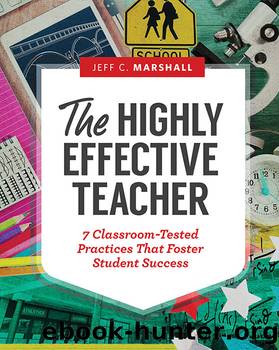The Highly Effective Teacher by Unknown

Author:Unknown
Language: eng
Format: epub
ISBN: 4513997
Publisher: Association for Supervision & Curriculum Development
Published: 2016-04-01T00:00:00+00:00
Action: Match the Challenge to Current Ability
As a child, I remember experiencing exhilaration one moment and sadness the next when playing the game Chutes and Ladders. In an instant, I could move from near the bottom of the game board to the very top. The opposite was also true; I could be nearing the final square only to land on a chute that would send me cascading toward the bottom. For many students, learning is very similar; they watch others "get it" quickly while they struggle and seem to get further and further behind.
How we respond to these differences distinguishes us as educators. We must move beyond just allowing the struggling student to repeatedly flounder and fail. By the time students reach middle school and high school and have experienced years of failure, how can we be shocked that they are not excited to begin another "prison" term in school? Likewise, just because students quickly show mastery of the material, we can't leave them alone and expect them to leap to increasingly higher levels of success.
Nor is the answer found in tracking and ability grouping. It frequently pacifies the parents of high-performing kids, but all suffer as a result. Reviewing a little history shows that tracking was and commonly still is used as a tool for separating white, privileged students from the perceived lower-achieving African American students (Mickelson, 2003). These findings date back to federal court cases as early as the 1850s, such as Roberts v. The City of Boston, which upheld the notion that separate curriculums were needed for whites and blacks because of the inherent differences in the abilities of the races.
We can't continue to perpetuate these stereotypes. In the real world, we don't track people in the same way. For example, although some teachers currently demonstrate that they are more adept at their craft and spend more time preparing for lessons than others, we don't separate the top teachers from those who are less successful. Why should it be any different for our students? Yes, I can hear the rumblings that this stance might generate, but tracking or ability grouping is a practice that should be stopped. Once we begin to understand the strength that diversityâincluding diversity in current abilityâprovides, then we can begin to concentrate on differentiating so that all learners succeed. Realize that separating students into different classes by their perceived ability level is not what is meant by differentiation.
As students work in teams or individually to solve challenges, perplexities, scenarios, or inquiries, you can vary the degree of support that you provide. For ESOL students or students who struggle with basic literacy, you could provide a list of key vocabulary with illustrations and succinct definitions on a laminated card to help guide their conversations, writings, and explorations. They may already have these in their notes (or not), but the goal is to reduce the cognitive load and struggle with things that are secondary to succeeding with the given lesson. In mathematics, you could provide
Download
This site does not store any files on its server. We only index and link to content provided by other sites. Please contact the content providers to delete copyright contents if any and email us, we'll remove relevant links or contents immediately.
The Art of Coaching Workbook by Elena Aguilar(51198)
Trainspotting by Irvine Welsh(21662)
Twilight of the Idols With the Antichrist and Ecce Homo by Friedrich Nietzsche(18632)
Fangirl by Rainbow Rowell(9247)
Periodization Training for Sports by Tudor Bompa(8271)
Change Your Questions, Change Your Life by Marilee Adams(7780)
This Is How You Lose Her by Junot Diaz(6885)
Asking the Right Questions: A Guide to Critical Thinking by M. Neil Browne & Stuart M. Keeley(5772)
Grit by Angela Duckworth(5614)
Red Sparrow by Jason Matthews(5471)
Paper Towns by Green John(5188)
Room 212 by Kate Stewart(5119)
Ken Follett - World without end by Ken Follett(4731)
Housekeeping by Marilynne Robinson(4445)
The Sports Rules Book by Human Kinetics(4385)
Papillon (English) by Henri Charrière(4273)
Double Down (Diary of a Wimpy Kid Book 11) by Jeff Kinney(4268)
The Motorcycle Diaries by Ernesto Che Guevara(4098)
Exercise Technique Manual for Resistance Training by National Strength & Conditioning Association(4071)
